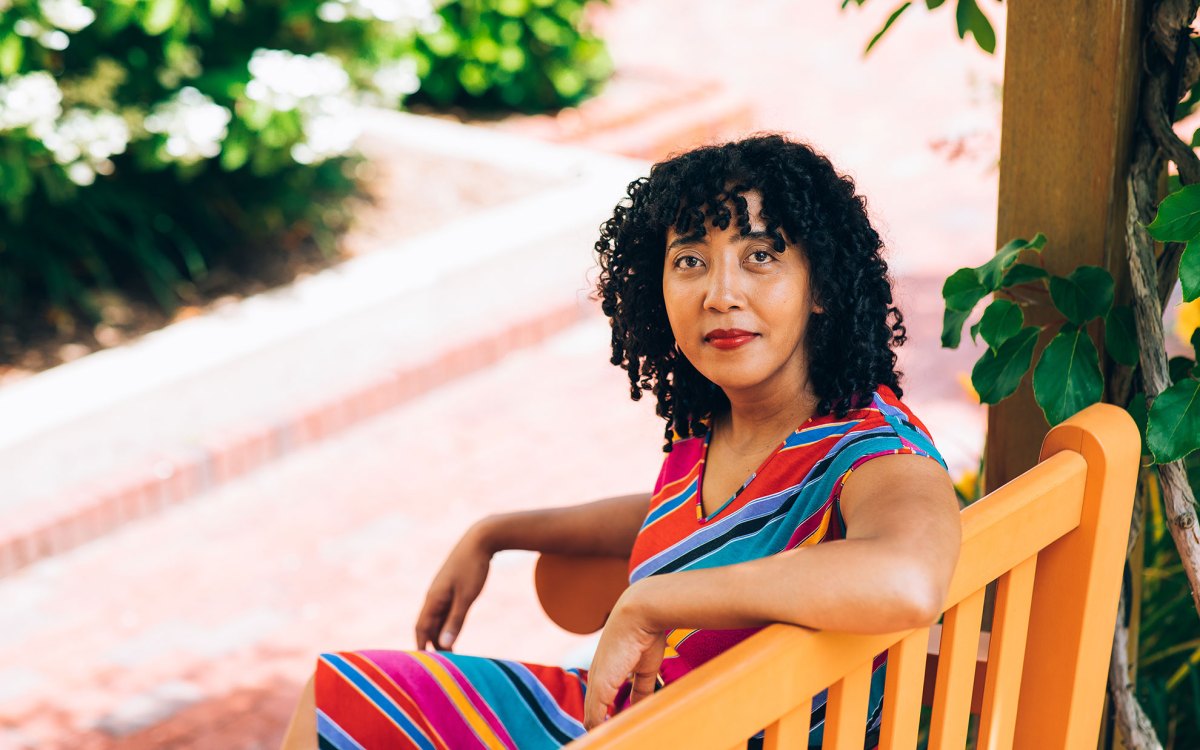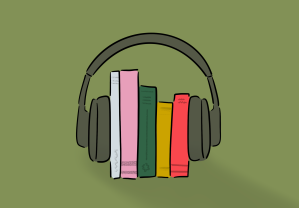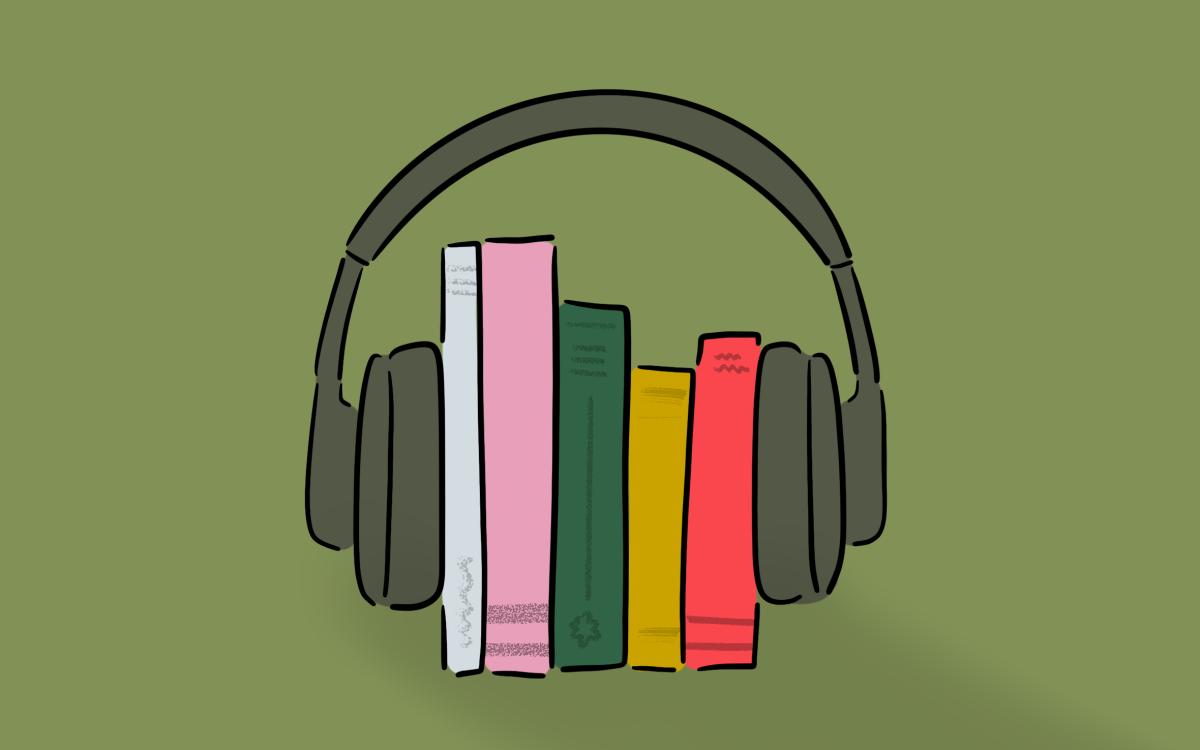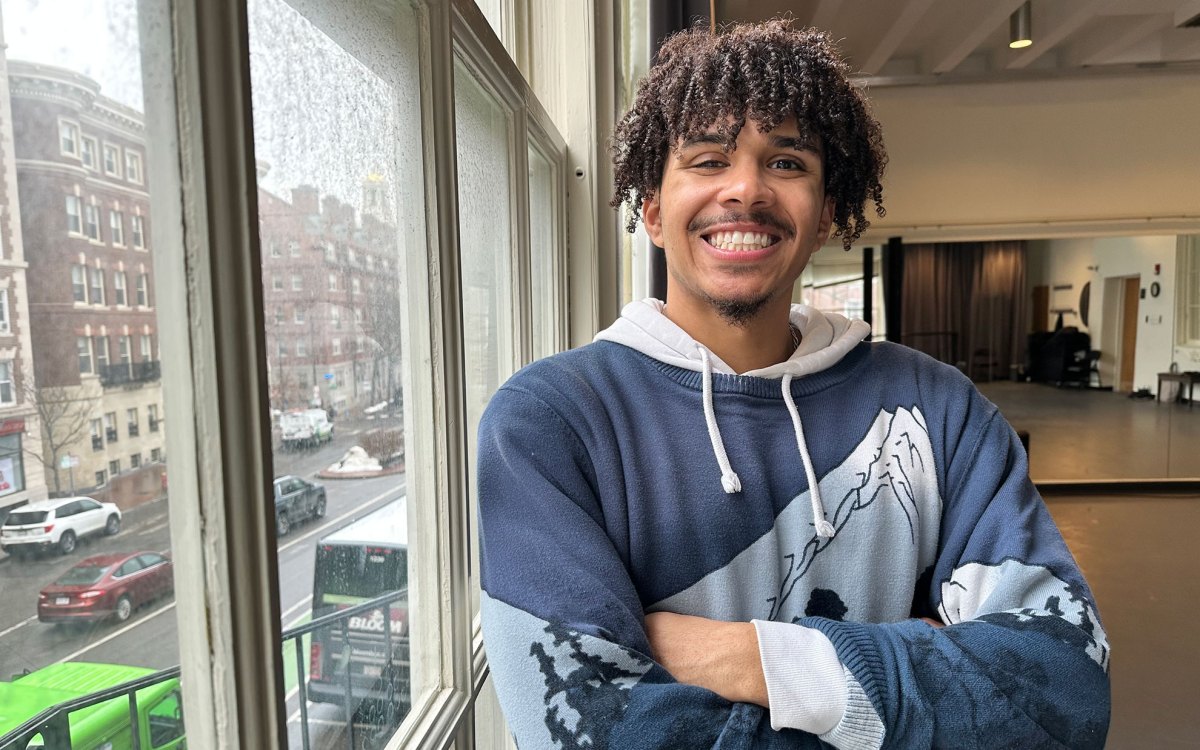New adventures in editing
George Andreou brings his hunger for greatness to Harvard University Press
Last month, George Andreou became the new director of the Harvard University Press, taking over for William P. Sisler, who held the post for nearly 27 years.
The son of an American mother and a Greek father, Andreou was born in New York but spent his early childhood in Greece. He graduated from Harvard College in 1987 with a degree in English literature and languages. At Alfred A. Knopf, where he advanced to senior editor and vice president, Andreou founded Vintage Español, an imprint dedicated to publishing fiction and nonfiction in Spanish for the U.S. market, and worked with literary and intellectual stars such as John Ashbery, Junot Díaz, Henry Louis Gates Jr., Sonia Sotomayor, and the Nobel laureates V.S. Naipaul and Orhan Pamuk.
The Gazette sat down with Andreou in his Garden Street office to talk about learning by example, the power of narrative, and his vision for Harvard University Press.
GAZETTE: I am curious about your interest in books. I know you got your bachelor’s degree in English literature and languages here at Harvard. Talk to me about where that interest came from. Is that something that your parents instilled in you? Were you a big reader growing up?
ANDREOU: No. I think there were always books around me and I was interested in books but I was not what you would call a voracious reader. And in fact, the bane of my life in publishing has been keeping pace, in one way or another, with people who simply like to read for the sake of reading. Depending on what you are reading, reading can be an extremely boring thing to do. And so I have sympathy for those people who don’t like to read.
GAZETTE: So, just to make sure I am clear. Do you enjoy reading?
ANDREOU: There’s nothing I enjoy more when it’s gratifying my desire for something great. When it’s less than that, I find myself only wishing I could read faster. When it’s something great …
GAZETTE: You don’t want it to end?
ANDREOU: I do want it to end. I don’t want “The Book of Sand,” I don’t want that kind of Borgesian nightmare, but I find myself pausing over things, reading them again. As an editor I am fascinated by the way writers accomplish things on the page. And so I find myself pausing with an analytic eye to ask, “How did he do that?” “How did she make that turn?” And at certain times, with a kind of pedagogical interest, because having taught fiction, I like to be able to explain to people how they can do certain things and often to give them useful examples. Learning by example is the easiest way to learn.
GAZETTE: Were there any books that were seminal to you, or had a big impact early on?
ANDREOU: That’s such an interesting question. Certainly all of Shakespeare I read early on. The King James Bible, I think. These, in a way, were part of acquiring English — it wasn’t my first language — as were American popular songs. But as to particular books, I think I’d say that Dostoevsky was a very early passion. Dickens was a boyhood fascination. And then I think I became attracted to more compact things. But I don’t know that I’d say that particular books were transformative in the way that people mean when they make that claim. It’s an interesting claim, really. I rather wish I could make it of something.
GAZETTE: I think the Bible and the Bard are both pretty good. I always liked the way that Lincoln was deeply inspired by both.
ANDREOU: Yes. Whenever I read Lincoln … I am always full of admiration for how much of the potentialities of English he learned from what he is said to have read. I think that if you read less and better, well, that’s like eating less and better, your health will be improved. There’s a lot of junk food to be read.
GAZETTE: What do you think about books that capture the popular imagination, strike some kind of deep common chord, but that may not be considered necessarily great works of literature?
ANDREOU: It’s different in every case, I think. But in general, there are two things at work. There’s the elevation of reading as a democratic virtue. It’s becoming less unacceptable, but still no one likes to say, “I don’t read,” or “I’m not reading anything.” Reading anything at all allows people to participate in the celebration of that democratic virtue, and all the more so when we are reading the same thing as our fellows. So there is a communal dimension. And the other thing is that much of what strikes such a chord satisfies in particular the same sort of, I guess I would say, narrative hunger that television satisfies without the added cognitive demands. Humans are very naturally attracted to narrative. They cannot resist narrative. They find narrative more persuasive than logical argument, so I think it’s a way of being human. We’ve always had narratives of one kind or another, though they weren’t available for popular reading for most of human history. But now they are, and we have a higher degree of literacy — toward what end I am not always sure, but we do. And so there is that.
GAZETTE: You taught creative writing at the City University of New York. Do you think being a teacher made you a better editor?
ANDREOU: I think being an editor made me a better teacher, because being an editor, except when there is blind faith and obedience — and only occasionally is one blessed with that on the part of an author — except in those cases, one must explain. One must explain why one is doing what one is doing. And often the thing to be explained is a very abstract thing, or a subtle thing, and so editing hones one’s skills for explaining. And a teacher has to be able to explain.
GAZETTE: Turning to your new position here: Tell me what your role is. I think of the publisher as the person who makes the final decision about which books get published. What are some of your other responsibilities?
ANDREOU: Well, I just got here. So I haven’t been doing much of anything except learning the floor plan and the names of 70-plus people in this building. I’m responsible for the whole thing. I should say that I do decide what is published, but as a formal matter, a university press publishes under the authority of the board of syndics, a collection of eminent faculty who have expertise in the various areas in which we publish. There is a feature of every publication contract that says the manuscript must be acceptable to the publisher. That acceptability, formally, is at the discretion of the syndics. But whether a book is commissioned in the first instance — that is for me to decide. There’s also a rubric called “director’s choice,” so if it’s not something that the syndics might be able to advise us about, it can still be published. But most things, before they are put on a list, they go before the syndics and we discuss them. And they give their blessing.
GAZETTE: Are the syndics only from Harvard?
ANDREOU: Yes, they are only from Harvard. A university press has a reputation to uphold while the justification in a trade house is ultimately a commercial matter. Whether the book is good or bad, it is for the editors and publishers to decide that it’s publishable. But if a book is venturing into territory where there is right and wrong, we are not experts here, we need to have the judgments of the experts, and they guide us superbly. I am full of admiration at how much work the syndics do to protect us from embarrassment.
GAZETTE: Can you talk a bit about your vision for the press?
ANDREOU: Well, I think that better taking into account end users, otherwise known as readers, is a worthy goal for any publisher at this time. I think there has been enough of a bifurcation of sensibilities that you really need to be able to publish in two registers. You need to be able to publish for the special constituencies, often relatively small — the people to whom often a very specialized book might be addressed. And yet there are some books that can have a wider audience. This is of course the Holy Grail of all publishing. No one wants a narrow audience as such. It seems to me that the trend line for trade publishers suggests less and less patience and capacity for what are called midlist books, which is to say the books that won’t crash and burn but also don’t hugely affect the bottom line one way or the other. Such books require a great deal of patience and expertise. But there are fewer people with those traits entering trade publishing. So it seems to me there will be more opportunities to compete with trade houses for books that they are publishing less full-heartedly than they might have done at one time. Publishing is all about context. We don’t create a list just to have more books. We create a list to lend context to individual publications, and it’s better to be at the top of a list like HUP’s than to be, as it were, the garnish on the plate at a big-five publishing house. At least I hope people will see that it’s better. We have to show them that we are not lacking for the competencies and most of the resources of the big commercial publishers. I think the idea is that someone who’s come up in the business through that side would better know how to replicate those competencies in a place where they might not be blooming as naturally.
GAZETTE: How do you see the work of Harvard University Press in the digital age? There have been some important digitization projects lately. Do you anticipate more?
ANDREOU: Well, the digitization of the Loeb Library has been a great success. The great fear with digital is always that you will cannibalize the print side. No one wants print books to go away; even people ambivalent about reading don’t want print books to go away. And they won’t be going away. In general, the reality is that electronic sales have plateaued. A few years ago it seemed they would be heading toward 100 percent of market share. That hasn’t come to pass and it’s not likely to. I think some of that was driven by the fascination with new devices, not any inherent superiority of reading a glowing page. The printed book is still the most agreeable thing to read. In some cases, however, there are advantages to the electronic version. The Loeb Classical Library is searchable and has various other features useful to its scholarly users, quite apart from its being something you could take on the train. I think that the future of electronic formats will depend on the development of functionality. I don’t see any radical change coming in the near term, although I would say I could imagine our publishing certain kinds of content in the form of an app, for instance. There’s no reason that we couldn’t do that. There are some things that exist as books out of a kind of practical necessity but not as the ideal way of arranging the information. Certainly anything that is not a narrative can have an interface better than a book, with its pages that necessarily follow a certain order.
GAZETTE: Is there one thing about the job you are most looking forward to?
ANDREOU: Well, I’d say, because of the various things that I described, this place will not be quite the same place in five years’ time. That would have been true whether I was here or not, and I guess I am looking forward to being the one who will determine what it will be. It is a great institution attached to a great institution, full of history and achievement. The stewardship of it is, I think, really an immense honor and apart from any anxiety of not doing it justice, I look forward to steering it into some new direction.
GAZETTE: What are you reading right now?
ANDREOU: I was just finishing up a book I hadn’t read in years, Conrad’s “Under Western Eyes.”
GAZETTE: So that’s something you’ve gone back to?
ANDREOU: Yes, but it’s virtually like reading a new book.
GAZETTE: Why?
ANDREOU: No book is ever the same book for two different people and insofar as we are never the same person we were before, the book that — and here I am betraying a little bit of my training in literary studies — a book that we constitute at one point in our lives by our reading it is different from the one that we created in our minds when we were younger. It just has a different set of resonances, a different meaning for us. The sign of a great book is that it still seems to us great upon revisiting it. Lots of things seem impressive to people when they are young, but then one goes back to discover that they were really rather ordinary. I won’t mention one of those.
Interview was edited and condensed.




